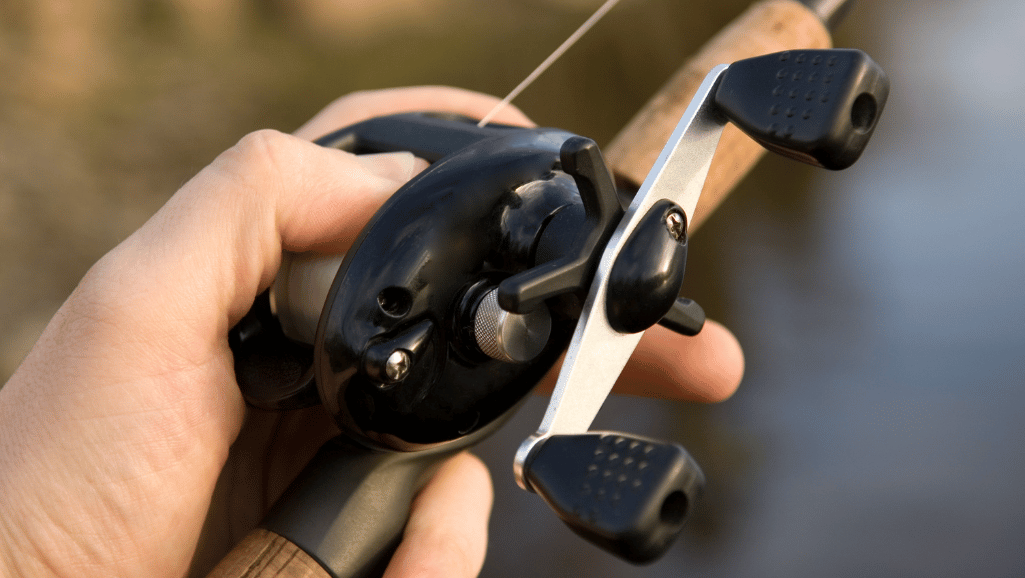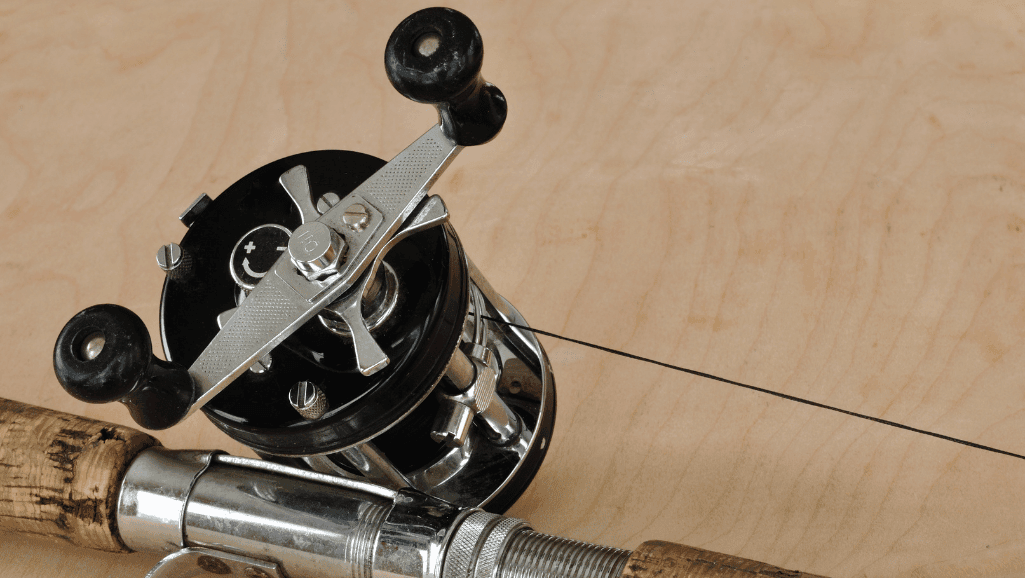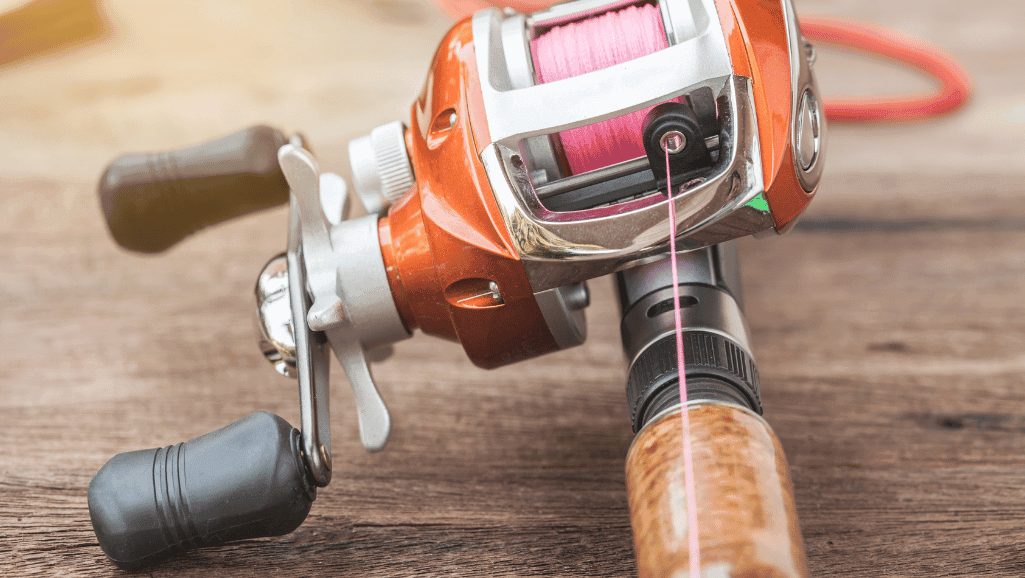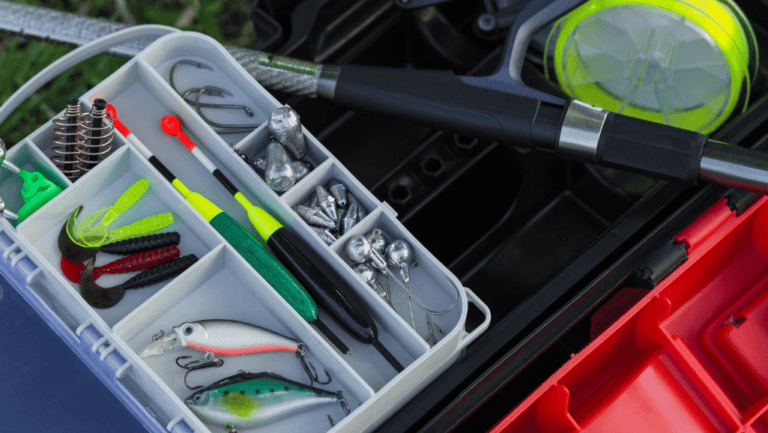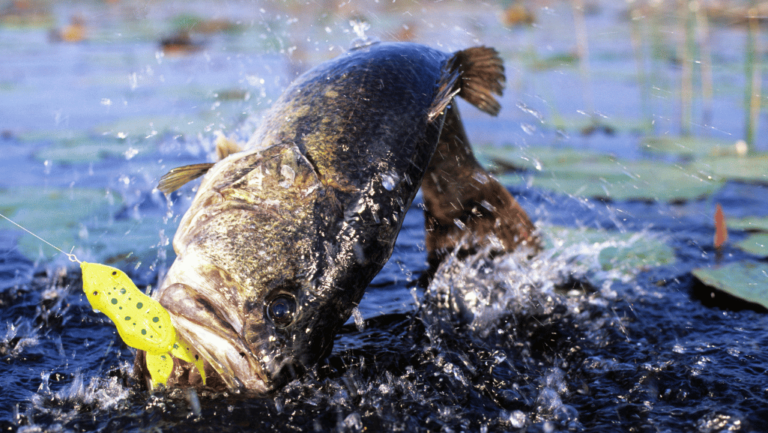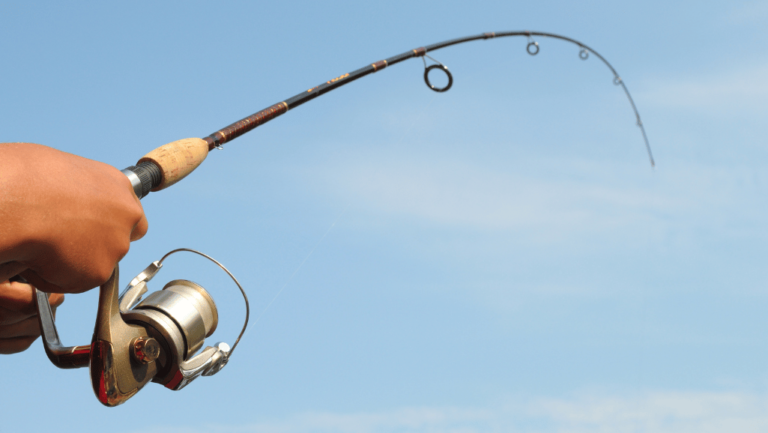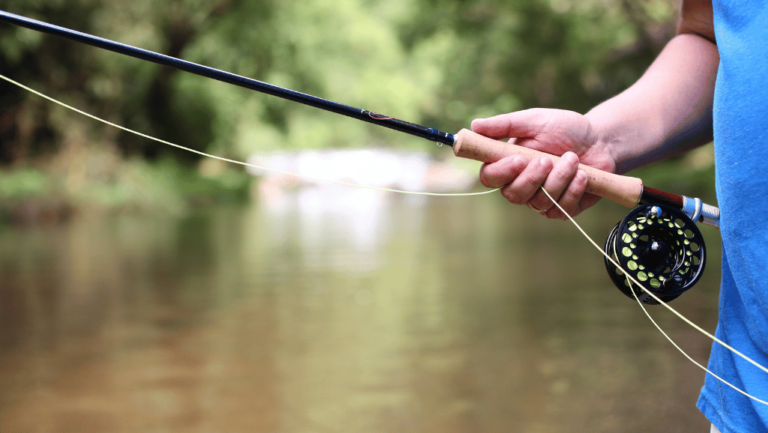Braking systems in baitcasting reels are key to stop backlashes. They save anglers from frustration and wasted time. We will explore the workings of baitcaster magnetic brake systems. We’ll look at insights from fishing experiences and expert analysis. You’ll learn about centrifugal brakes, magnetic brakes, spool tension adjustment, and thumb control.
Daiwa’s Air Brake System leads the way with its advanced technology. Magnetic brakes in this system adjust the distance between the spool and magnets. This fine-tuning greatly improves how you cast.
Baitcasting reels usually have at least six centrifugal brake pads. These pads can be turned on or off. Setting the spool tension tighter than you need at first helps prevent backlashes. Later, use your thumb to speed up the spool towards the end of your cast.
Key Takeaways
- Magnetic brakes offer superior control over casting distance and accuracy.
- Most reel systems include adjustable centrifugal brake pads for added control.
- The spool tension adjustment knob should not replace proper brake settings.
- Setting the magnetic brake dial to around 50% is ideal for fine-tuning.
- Daiwa’s Air Brake System exemplifies advanced magnetic brake technology.
Introduction to Baitcaster Magnetic Braking Systems
Magnetic brakes are key in baitcasting reels for all anglers, new or seasoned. They stop backlash by controlling the reel effectively during casting. Anglers can adjust these brakes easily. Simply turn a dial to move the magnets closer or farther from the spool.
The best baitcasting reel with magnetic brake changes how fishing feels for many. It means smoother, more accurate casts. This makes fishing easier and more fun. Whether you’re starting out or already skilled, these brakes are a big help.
Magnetic brakes are great because they let you make tiny changes. These lead to better casts and less annoying backlash. You have to set the spool tension and start the centrifugal brakes first. But, then you get to use the magnetic brakes for even more control.
Daiwa’s Air Brake System is praised for being an industry leader. It shows the full potential of magnetic braking technology. This system improves casting by a lot, making it more exact and dependable.
Knowing about all the parts of a fishing reel can really make a difference. This includes the brakes, how tight the spool is, and even how you hold it. Learning this stuff helps you master baitcaster reels. And that’s both fun and rewarding.
How Magnetic Braking Systems Work
Magnetic brakes are key for anglers aiming for accurate casts with less hassle. They make sure your fishing trip goes smoothly by controlling the speed of your line reel. This means you’re less likely to have to deal with tangling or snarls.
Mechanics of Magnetic Brakes
These brakes rely on magnets to slow down the spinning reel. The closer the magnets are to the spool, the more it slows. This action decreases the chance of your line getting tangled.
- You can adjust magnetic brakes using a simple external dial for convenience.
- They work with electromagnetic power, which helps match the reel’s speed.
- Daiwa’s version uses a special cup and rings design for top-notch performance.
Because of this design, the reel spins smoothly after you’ve cast. This helps make your whole fishing adventure better.
Adjusting Magnetic Brakes
Adjusting these brakes is easy. Just follow these steps:
- Turn the dial to around 50% strength as a starting point, as many have found it helpful.
- Cast a line to see how it works. Then, tweak the settings based on the results.
- Also, don’t forget to adjust the tension knob to keep your cast smooth at the end.
- As you get better, you might need the magnetic brake less. Instead, you can use your thumb to control the line.
Companies like Daiwa and Shimano keep making advances with systems like the Air Brake and Variable Braking System. Knowing how to use these can really boost how well you fish and craft your cast.
Components of a Magnetic Brake System
To improve your baitcasting reel, you need to know how a magnetic braking system works. These systems have important parts that help with controlled casting. This is crucial for anyone who enjoys fishing.
| Component | Function | Highlighted Brand |
|---|---|---|
| Spool Tension Knob | Adjusts the spool tension to control the lure’s fall rate. | Daiwa |
| Magnetic Dial | Modulates the magnetic force applied to the spool. | Tatula Series |
| Inductors | Attracts the magnets to slow down the spool during a cast. | Daiwa’s MagForce Z |
| Magnets | Produces electromagnetic force to manage spool speed and prevent backlash. | Various Brands |
Every piece of the baitcaster magnetic brake system is important. Together, they make casting smooth and controlled. Take the Daiwa Air Brake System for example. It uses special inductors and adjustable magnets to keep the spool just right. This makes your casting better and keeps your equipment in good shape.
Many brands are always making their magnetic braking systems better. Shimano, for instance, has a top-notch Variable Braking System (VBS). Unlike basic magnetic brakes, the VBS by Shimano can change its braking power as needed. Because of these improvements, fishing with a magnetic braking system is getting better for anglers all over.
Setting Up Your Baitcaster Magnetic Brake
To cast your baitcaster well, setting up the magnetic brake is key. You need to know how the spool tension and your thumb work together. This helps lower the chances of backlashes and lets you cast farther.
Spool Tension Adjustment
The spool tension adjustment on a baitcasting reel controls how fast the spool stops turning. It’s often on the side of the handle. You should set it so your lure slows down when you move the rod a certain way. Doing this at first might make your casts shorter. But it makes backlashes happen less often. Over time, you’ll learn to adjust it for longer casts.
Thumb Control
Thumb control is key for avoiding backlashes. You stop the spool with your thumb just before your lure lands. This move is great for dealing with tricky casting situations. Learning to use your thumb well makes your casts more accurate. It also means you’ll have fewer backlashes.
Getting the spool tension adjustment right and using your thumb well will make you a better caster. It’s all about controlling your baitcaster’s magnetic brake. With practice, everyone can get better at casting. This is true for both new and experienced anglers.
Advantages of Using a Magnetic Brake System
Magnetic brake systems in baitcasters offer many benefits. They help anglers cast farther and control the line more precisely. Brands like Daiwa and Shimano show how these systems shine with new tech.
Increased Casting Distance
With a baitcaster’s magnetic brake, you can cast further. For example, Daiwa’s system lets the reel start fast with no brakes, spins just right in the middle, then slows without sticking at the end. You get every bit of speed for a smooth, long cast. This makes sure every cast reaches as far as possible, hitting your spot exactly.
Reduction in Backlash
Backlash used to be a big problem with baitcasters. But now, advanced magnetic brakes help a lot. Rather than keep the same brake on the entire cast, Daiwa and others adjust it as you cast. This keeps the line from tangling. This saves time and makes fishing more fun since your line won’t suddenly stop.
Comparison of Popular Brake Systems:
| Brake System | Mechanism | Advantages |
|---|---|---|
| Daiwa Air Brake System | Spring-loaded inductor cup, adjustable magnetic rings | Virtually eliminates backlash, increases casting distance |
| Shimano VBS | Variable braking based on spool speed | Efficient, dynamic braking for ultra-light lures |
| BFS Reels | Efficient braking mechanisms | Handles light lures efficiently |
Baitcaster Magnetic Brake vs. Centrifugal Brake
When picking a brake system, anglers must choose between a baitcaster magnetic brake and a centrifugal brake. Knowing how each works and its advantages can improve fishing trips greatly.
Magnetic Brake Overview
A baitcaster magnetic brake uses magnets and the reel’s spool to control speed. By moving these magnets, you adjust how fast the spool stops. This makes casting smoother and more accurate, especially at first.
Magnetic brakes are easy to adjust from the outside. This saves time and trouble, as you don’t have to take the reel apart to tweak it. They’re great for stopping backlash, which helps you cast better.
Centrifugal Brake Overview
Centrifugal brakes control the spool speed differently. They have six pads you can turn on or off to adjust how the spool starts spinning. This feature helps anglers who need precise control when they cast.
Adjusting centrifugal brakes requires some care, as you need to open the reel’s side. But, many anglers like them because they work well in different situations. As you get better, you can fine-tune these brakes for even better results.
Magnetic and centrifugal brakes each have their strengths. Your choice will depend on what you like and where you fish. Some advanced reels even use both technologies to give anglers the best of both worlds.
Knowing what each brake system does can help you choose wisely. For more in-depth information, check out detailed guides on fishing brakes. They’ll help you understand each system better.
Top Magnetic Brake Baitcasting Reels
Anglers searching for top magnetic brake baitcasting reels prioritize accurate casting and control. It doesn’t matter if you fish every day or just started, choosing the right reel is key. A top baitcasting reel with magnetic brakes guarantees you’ll perform well on the water.
Best Models and Brands
Daiwa’s Air Brake System is ahead of the pack. It improves on the popular MagForce Z with Daiwa’s own twist. This means you won’t have to worry about backlashes, a big win for any angler. On the other hand, Shimano’s VBS was the top choice for brake systems, until Daiwa came along.
The Daiwa Tatula series is a favorite in the baitcasting world. These reels have a special kind of magnetic brake. They give you more control, making your casts more accurate with fewer backlashes.
Features to Look For
Key features are a must when picking a magnetic brake baitcasting reel. Look no further than the Daiwa Air Brake System for these:
- A spring-loaded cup and magnetic rings for brake control.
- It allows quick spool spins at first, then max brake power, and eases up at the end.
- No friction means your casts are smooth and your reel lasts longer.
Reels with the T-Wing System, found in Daiwa reels, cast further and more efficiently. They avoid backlash by not losing braking power to moisture or oil like other types can.
| Brand | Model | Key Features |
|---|---|---|
| Daiwa | Tatula Series | Magnetic Brakes, T-Wing System, Air Brake System |
| Shimano | Curado Series | Variable Braking System, Hagane Body, X-Ship |
| Daiwa | Zillion Series | MagForce Z, UTD Drag, Free-floating spool |
To dive deeper into the Daiwa Air Brake System, check out articles like this.
Common Issues and Troubleshooting
Anglers often face problems with baitcaster brakes, like backlashes and the need for regular care. These can spoil a fun fishing trip. But, by using the right methods to troubleshoot and maintain your reel, you can overcome these challenges.
Backlash Problems
Backlash happens when the spool spins faster than the line goes out, causing tangles. To fix this, adjust your baitcaster brake properly. It’s key to use the spool tension just right. This keeps the spool from turning too fast when you stop the lure.
Set the spool tension tightly then work on the centrifugal and magnetic brakes. Fine-tune these. Also, control the spool with your thumb at the end of your cast. This avoids backlash. Practice does help. It lets you use fewer brakes and make better use of the magnetic force. This improves your casting accuracy and distance over time.
Brake System Maintenance
Maintaining your reel’s braking system is crucial for its smooth working and long life. Clean the brakes often to get rid of debris. And oil the parts according to the manual for best performance.
Regularly check and adjust your reel settings. This includes the magnetic brake dial. Doing this without taking the reel apart improves how far and how well you can cast. For example, turning two brakes on and four off can enhance your fishing experience.
By keeping your reel in top condition, you can have a better time when out fishing.
Optimizing Your Magnetic Brake Settings
Making the most of your baitcaster’s magnetic brake setting can boost how well you fish. This part will show you how to tweak your settings for different casting situations.
Fine-Tuning Techniques
If you want to be a pro with your baitcasting reel, getting the magnetic brakes just right is key. Start by setting the tension knob properly to stop the spool from wiggling. Turn all the brakes on a bit if you’re new or using heavier lures, about 3/8oz or 1/2oz. Then, as you get better, you can lower the brakes to see how it affects your cast.
Adjustments Based on Conditions
How and where you cast is crucial when setting your brakes. If it’s windy, tighten the brakes to avoid backlashes. But, on a still day, you might want to loosen them for farther casts. Also, if you change to a lighter lure, you’ll probably need to adjust the brakes again to prevent tangles.
Don’t forget about the distance from the tip of the rod when you start a cast. It’s usually around 18 inches. Using your thumb to lightly slow the spool can help too. Always remember, you only adjust brakes when you switch lures; the knob setting stays the same.
Using these tweaks, along with watching the conditions, helps you get the most from your brakes. Being good at this can really improve how you fish. Every cast will be smoother and more accurate.
Expert Tips for Using Magnetic Brakes
If you know how to use a baitcaster magnetic brake, you can catch more fish. We get tips from the pros to help you become an expert too.
Professional Angler Insights
Pro anglers say it’s key to set your magnetic brake right for best results. They recommend the old but gold Daiwa 7HT for its reliable brakes.
The Okuma MG-30CS is praised for its magnetic brake adjusting well for different fishing needs. It’s great for big fish on the beach because it’s precise. Penn’s 525 series is also popular, offering both speed and control.
Advanced Casting Techniques
Learning advanced casting moves helps a lot. It’s even better when you have a well-set baitcaster magnetic system. The Mag reel’s zero setting is perfect for far or field casting.
Getting the magnetic brake just right is key for better casting. Experimenting with different weights and brake settings can help you get better. It’s all about finding the best balance between speed and control.
Following these expert tips and techniques will up your fishing game, making your gear work better for you.
Conclusion
Learning to use a baitcaster’s magnetic brake system well is key for great casting. The technology in systems like Daiwa’s Air Brake has made big strides. This surpasses older methods like Shimano’s Variable Braking System (VBS).
Daiwa’s Air Brake System boasts a special design without friction. It has a spring-loaded inductor cup and adjustable magnetic rings. This system doesn’t wear out fast and adjusts brake power as needed, making casting smooth.
The growth in magnetic brake tech, seen in systems like Daiwa’s Air Brake, makes precise casting easier. Anglers of all levels can benefit from better casting distance and control. Using these advanced systems can really upgrade your fishing game and make your time on the water better.

